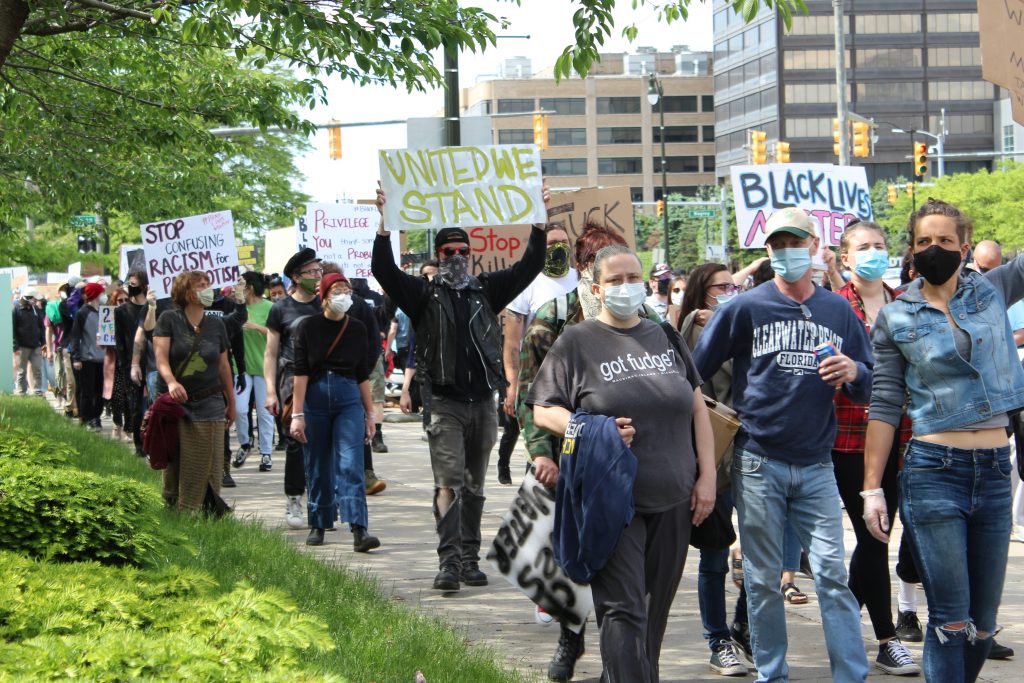Systemic Racism, Protests and Cultural Reckoning Amid COVID-19
Henderson and others explore this moment of rising racial and social tension around the country based in systemic racism and police brutality amid a global pandemic.

It has been a tense weekend in Detroit and across the country as protests over the police-involved killings of George Floyd, a black man in Minneapolis, and Breonna Taylor, a black woman in Louisville, Ky. These killings are part of a long thread of violence in this country against African Americans. The protests are part of a legacy that includes former NFL player Colin Kaepernick kneeling during the National Anthem prior to games.
“It all comes down to the value of a black life. If white America would have listened to what Colin Kaepernick had to say in 2016, I don’t think we’d be where we are today.” — Martenzie Johnson, The Undefeated
Detroit Today host Stephen Henderson leads a conversation about the ensuing public debate.
Listen: Systemic Racism, Protests and Cultural Reckoning
Stephen’s Introduction
I think I’m supposed to offer words that advance the conversation, and shed light on the dynamics that have led to the massive demonstrations and protests and, yes, rioting, that we’ve seen over the past four days.
But before we get to all of that, before we try to think through all this together, I want to say something about how you are feeling. And let’s start with this: Whatever you’re feeling right now, however you’re reacting to stark images and messages we’re all trying to process — it’s okay. It really is okay. The anger. The sadness. The frustration. Whichever of those emotions is consuming you right now… it’s okay.
All of what we’re seeing comes on top of the most devastating pandemic in a century. And I think by now, all of us just feel worked over to the point of being raw — about nearly everything. So our emotions were all over the place even before a white police officer murdered George Floyd, a black man, in Minneapolis, or before Amy Cooper threatened to invoke the weight of institutional racism against Christian Cooper in New York’s Central Park.
The things we have seen in the last few weeks are reminders of the troubles we had before COVID-19. But the combination of the two is just overwhelming — just too much. And let me go further. Especially if what you’re feeling right now is confused or conflicted… that’s really okay. This is confusing stuff. This is complicated stuff. The police brutality that sparked these demonstrations has its roots in decades, and centuries of inequality that we, as a nation, have been unable, and in many ways unwilling, to correct.
Guests
Ryan Patrick Hooper, co-host and producer of WDET’s Culture Shift. Hooper has been following the protests in Detroit for WDET and NPR.
“I don’t think this is going to end quickly. I think this is the kind of thing that is going to linger. I think the interest is only going to grow,” says Hooper.
Jelani Jefferson Exum is a Professor of Law at the University of Detroit Mercy School of Law.
“We do everything we can do in our courts to protect lives, at least that’s the ideal that we put forth,” says Professor Jelani Jefferson Exum, who says officers killing people amounts to “the death penalty on the street.”
She adds that “calling the police on black people simply living their lives [is] about using the police as weapons because there’s this understanding that there’s often this disproportional reaction from law enforcement.”
Martenzie Johnson is a sports writer for The Undefeated, who wrote a piece over the weekend titled “Colin Kaepernick tried to tell white America.“
Johnson tells Henderson that from his view, “It all comes down to the value of a black life. If white America would have listened to what Colin Kaepernick had to say in 2016, I don’t think we’d be where we are today.”
Trusted, accurate, up-to-date
WDET is here to keep you informed on essential information, news and resources related to COVID-19.
This is a stressful, insecure time for many. So it’s more important than ever for you, our listeners and readers, who are able to donate to keep supporting WDET’s mission. Please make a gift today.
